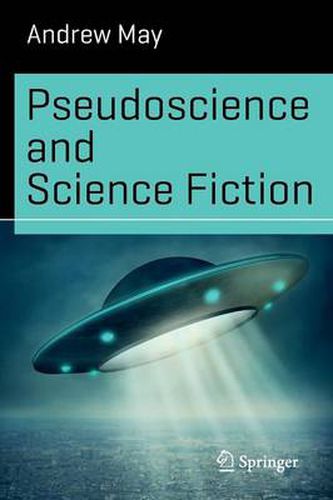Readings Newsletter
Become a Readings Member to make your shopping experience even easier.
Sign in or sign up for free!
You’re not far away from qualifying for FREE standard shipping within Australia
You’ve qualified for FREE standard shipping within Australia
The cart is loading…






This title is printed to order. This book may have been self-published. If so, we cannot guarantee the quality of the content. In the main most books will have gone through the editing process however some may not. We therefore suggest that you be aware of this before ordering this book. If in doubt check either the author or publisher’s details as we are unable to accept any returns unless they are faulty. Please contact us if you have any questions.
Aliens, flying saucers, ESP, the Bermuda Triangle, antigravity … are we talking about science fiction or pseudoscience? Sometimes it is difficult to tell the difference.
Both pseudoscience and science fiction (SF) are creative endeavours that have little in common with academic science, beyond the superficial trappings of jargon and subject matter. The most obvious difference between the two is that pseudoscience is presented as fact, not fiction. Yet like SF, and unlike real science, pseudoscience is driven by a desire to please an audience - in this case, people who want to believe . This has led to significant cross-fertilization between the two disciplines. SF authors often draw on real pseudoscientific theories to add verisimilitude to their stories, while on other occasions pseudoscience takes its cue from SF - the symbiotic relationship between ufology and Hollywood being a prime example of this.
This engagingly written, well researched and richly illustrated text explores a wide range of intriguing similarities and differences between pseudoscience and the fictional science found in SF.
Andrew May has a degree in Natural Sciences from Cambridge University and a PhD in astrophysics from Manchester University. After many years in academia and the private sector, he now works as a freelance writer and scientific consultant. He has written pocket biographies of Newton and Einstein, as well as contributing to a number of popular science books. He has a lifelong interest in science fiction, and has had several articles published in Fortean Times magazine
$9.00 standard shipping within Australia
FREE standard shipping within Australia for orders over $100.00
Express & International shipping calculated at checkout
This title is printed to order. This book may have been self-published. If so, we cannot guarantee the quality of the content. In the main most books will have gone through the editing process however some may not. We therefore suggest that you be aware of this before ordering this book. If in doubt check either the author or publisher’s details as we are unable to accept any returns unless they are faulty. Please contact us if you have any questions.
Aliens, flying saucers, ESP, the Bermuda Triangle, antigravity … are we talking about science fiction or pseudoscience? Sometimes it is difficult to tell the difference.
Both pseudoscience and science fiction (SF) are creative endeavours that have little in common with academic science, beyond the superficial trappings of jargon and subject matter. The most obvious difference between the two is that pseudoscience is presented as fact, not fiction. Yet like SF, and unlike real science, pseudoscience is driven by a desire to please an audience - in this case, people who want to believe . This has led to significant cross-fertilization between the two disciplines. SF authors often draw on real pseudoscientific theories to add verisimilitude to their stories, while on other occasions pseudoscience takes its cue from SF - the symbiotic relationship between ufology and Hollywood being a prime example of this.
This engagingly written, well researched and richly illustrated text explores a wide range of intriguing similarities and differences between pseudoscience and the fictional science found in SF.
Andrew May has a degree in Natural Sciences from Cambridge University and a PhD in astrophysics from Manchester University. After many years in academia and the private sector, he now works as a freelance writer and scientific consultant. He has written pocket biographies of Newton and Einstein, as well as contributing to a number of popular science books. He has a lifelong interest in science fiction, and has had several articles published in Fortean Times magazine